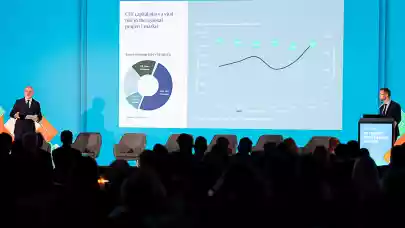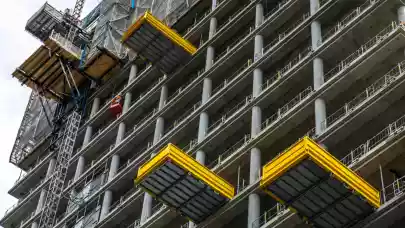
The Polish warehouse market maintained its robust momentum in the first half of 2020, with a record 2.38 million sqm leased. Gross take-up in the second quarter of 2020 – during a time of strict COVID-19 lockdown measures - was as much as 50% higher compared to the same period in 2019, at 1.36 million sqm. Such good outcomes were the result of high demand for space on the back of booming e-commerce trade and numerous BTS transactions which commenced earlier in the year, according to Axi Immo.
The warehouse real estate market has proved resilient to the global shock caused by the COVID-19 pandemic. The volume of logistics investment transactions closed in the first half of the year stood at almost €1.2 billion and accounted for almost 40% of total investment into Polish commercial real estate. Among the largest transactions carried out in Q2 2020 were a sale of Mszczonów Park (158,000 sqm) by P3 to Elite Partners Capital and a purchase of the Logistic City Piotrków (135,000 sqm) by Polish Logistics LLP, an investment platform established by REINO Capital, IO AM and Grosvenor Group. Yields on big-box assets currently stand at 6.25% while prime logistics assets in Warsaw-city fetch 5.5%. Yields remained unchanged in the first six months of the year due to the stable nature of the sector and robust occupier fundamentals combined with high investor demand.
„Although the real estate investment market in Poland is facing challenges in the near future, recent transactions give cause for optimism. Indeed, H1 2020 saw record investment volumes of around €1.2 billion. In the coming quarters, we are likely to experience further diversion of capital from the retail and office sectors to the warehouse sector. The availability of prime products on the market will remain a challenge” adds Renata Osiecka, Managing Partner at Axi Immo.
Strong occupier demand on the warehouse market
The first half of 2020 saw record occupier activity. In that period, gross demand amounted to 2.38 million sqm (+25% compared to H1 2019), led by Warsaw with 602,400 sqm leased, followed by Upper Silesia and Central Poland (396,000 sqm each) and Poznań (257,000 sqm). Moreover, 1.36 million sqm of space was leased in Q2 2020 - 50% more than in Q2 2019. In addition, short term leases amounting to 326,000 sqm were signed during the first half of the year – the highest level on record. New contracts and expansions accounted for 73% of overall take-up. The most active sectors in the H1 2020 were: logistics (25.5%), electronics (18%), retail (14.5%), e-commerce (14.4%) and production (7.5%).
„Tenant activity was very high in Q2 2020 due to a high number of BTS transactions that began earlier in the year and also – due to the exceptionally high demand for space dedicated to e-commerce. Additionally, a record amount of space was leased on a short term basis - under 2 years - between April and June. A total of 262,000 sqm was subject to temporary leasing agreements. Some tenants decided to fulfil expansion plans partly through temporary leasing contracts, in anticipation of market conditions normalizing after the end of the COVID-19 lockdown period,” says Anna Głowacz, Head of Industrial and Logistics Agency at Axi Immo.
The largest leasing transaction of H1 was signed by an undisclosed e-commerce occupier at Panattoni BTS Świebodzin for over 200k sqm. Other notable deals included a 73,400 sqm lease by Euro Net at Prologis Park Janki, a new contract for 72,900 sqm signed by Amazon at Hillwood Łódź Górna, a lease by a clothing producer for 67,000 sqm at Panattoni Park Czeladź IV as well as a 51,900 sqm new lease by a confidential tenant at Exeter Park Stryków.
“One of the long-term consequences of the COVID-19 pandemic is redefining the warehouse market in terms of online retail. Currently, we do not know the decisions of all the tenants, but we expect that a number of companies that will decide to exit their physical stores will still want to be present in the e-commerce channel. Therefore, withdrawal from shopping centres or retail parks will not necessarily mean a company's complete exit from the Polish market. This will provide a stimulus to the development of the warehouse sector, including smaller warehouse formats such as the SBU (Small Business Unit) projects, which offer not just warehouse space but also showroom space,” adds Anna Głowacz.
Will development activity decline in H2 2020?
During the first six months of the year, industrial developers completed a total of 1.1 million sqm of space (+9.6% compared to H1 2019), raising the total warehouse stock in Poland to nearly 19.5 million sqm (15.9% y/y). The highest level of completions was recorded in Warsaw (over 325,000 sqm), followed by Lower Silesia (200,000 sqm) and Upper Silesia (192,000 sqm). The three the largest new completions of H1 2020 were Panattoni’s A2 Warsaw Park (103,670 sqm), P3’s PepsiCo BTS in Mszczonów (58,500 sqm) and Hillwood’s Wrocław East II (52,400 sqm). In terms of the pipeline, 1.77 million sqm of space was under construction as at the end of June (-24% y/y). The largest amount of space is currently under construction in Warsaw and Lower and Upper Silesia. Lower activity is driven by caution among developers due to uncertain market conditions. Developers have also become more reluctant to develop space on a speculative basis. The share of speculative space in total space under construction fell from 45.3% at the end of March 2020 to 33.6% at the end of June. More limited development resulted in a significant decrease in the amount of space available immediately. The vacancy rate for the Polish market overall fell from 7.8% at the end of March 2020 to 6.8% at the end of June. The highest amount of space is available in Lower Silesia (10.1%), followed by Poznań (7.4%) and Central Poland (6.9%). In terms of the smaller markets, high development activity is underway in Tricity where an equivalent of 29% of this market’s stock is under construction and Western Poland where the pipeline translates into 71% of this market’s current size.
Rental levels remain stable
Rental levels remained unchanged in most markets in the first half of 2020. Average headline rents in big box facilities range between €3.20 and €3.60 per sqm while Warsaw-city remains the most expensive logistics location in the country (starting from €4.8/sqm). Effective rents have decreased slightly during H1, mainly in the regions with high vacancy rates and a high level of competition between developers. The lowest effective rents are still available in the suburbs of Poznań and Warsaw (Błonie and Grodzisk Mazowiecki in the latter).
“We expect that total warehouse stock in Poland will exceed 20m sqm by the end of the year, but the number of speculative projects will be limited due to caution on the part of developers. The spotlight will be on the quality and financial stability of the occupier. Further declines in the amount of space available immediately can be expected. On the demand side, logistics firms and e-commerce players are likely to remain the most important sources of activity. Some occupiers will be concerned about the re-introduction of lockdown measures and may pre-emptively increase stockpiling to mitigate potential supply chain disruptions and delays in production,” summarises Renata Osiecka.



